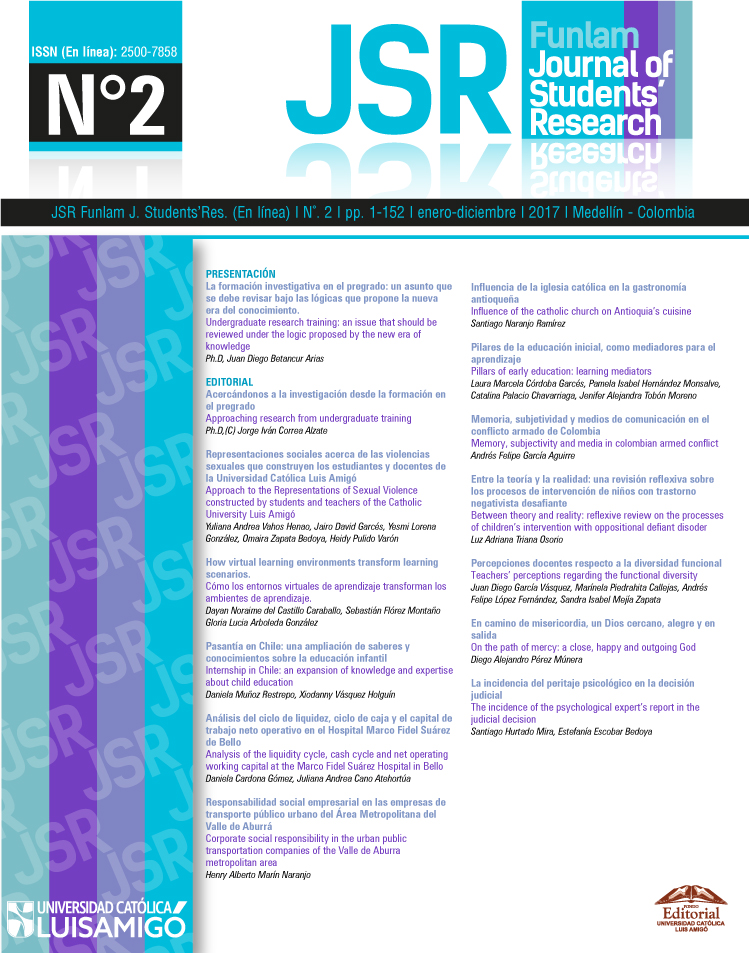Between theory and reality: reflexive review on the processes of children’s intervention with oppositional defiant disoder
DOI:
https://doi.org/10.21501/25007858.2592Keywords:
Oppositional defiant disoder, Neuropsychologique rehabilitation, Psychosocial rehabilitation, Symptom.Abstract
It is common that in infancy conducts of oppositional behavior of the norm and the figures of authority appear, it is presented a stable pattern in time and involve a significant deterioration in the relations that the child has established - besides of other factors – we can speak of Oppositional defiant disorder. The present article was born from the research experience in neuropsychology rehabilitation and psychosocial rehabilitation of children with this disorder. In the text, in a first moment are presented some generalities on the Oppositional defiant disorder; later there are exposed the biological, social and psychological factors that affect in the etiology of Oppositional defiant disorder, besides the role that complies the executive functions and other processes such as the attachment, the self-esteem and the recognition of the norm; then, I narrate my perception about the intervention process carried out with the Antares’ School children and there are exposed some elements that are presented like pertinent to have in consideration before, during and after the intervention process. Finally, there are presented some conclusions about the experience of intervention.Downloads
References
American Psychiatric Association (1995). Manual diagnóstico y estadístico de los trastornos mentales. Barcelona, España: Masson.
Araujo, E. (2012). Diferencias de la Función Ejecutiva en el Trastorno por Déficit de Atención con Hiperactividad y en sintomatologías asociadas. (Tesis doctoral). Universitat autònoma de Barcelona, Bellaterra, España.
Garrido, L. (2006). Apego, emoción y regulación emocional. Implicaciones para la salud. Revista latinoamericana de psicología, 38(3), pp. 493-507. Recuperado de: http://www.redalyc.org/pdf/805/80538304.pdf
Molina, D. (2003). Una pregunta del destino. El síntoma y su significado en la psicología de Jung. Revista virtual Universidad Católica del Norte, (11). Recuperado de http://revistavirtual.ucn.edu.co/index.php/RevistaUCN/article/view/295/559
Naranjo, M. (2007). Autoestima: un factor relevante en la vida de la persona y tema esencial en el proceso educativo. Revista electrónica “Actualidades investigativas en educación”, 7(3), pp. 1-27. Recuperado de: http://www.redalyc.org/pdf/447/44770311.pdf
Peña, F. y Palacios, L. (2011). Trastornos de la conducta disruptiva en la infancia y la adolescencia: diagnóstico y tratamiento. Salud mental, 34(5), pp. 421-427. Recuperado de: http://www.medigraphic.com/pdfs/salmen/sam-2011/sam115d.pdf
Rigau, E., García, C. y Artigas, J. (2006). Tratamiento del trastorno de oposición desafiante. Revista de Neurología, 42, S83-S88. Recuperado de: https://www.fundacioncadah.org/j289eghfd7511986_uploads/20120611_kTJZeneckKWcruUktzkO_0.pdf
Toro, G. (2007). ¿Cómo hacerse obedecer sin maltratar a los niños? En Sierra, G. (Ed.), ¿Sin límite? El extravío de la autoridad y su efecto en niños y adolescentes. Trastornos actuales asociados a la ausencia de norma (pp.119-157). Medellín, Colombia: Corporación Ser Especial.
Vergara, C. (2012). El niño hoy: una perspectiva clínica y pedagógica. EN-Clave Social, 1(1), pp. 58-66. Recuperado de: http://repository.lasallista.edu.co/dspace/bitstream/10567/705/1/184-390-1-PB.pdf


